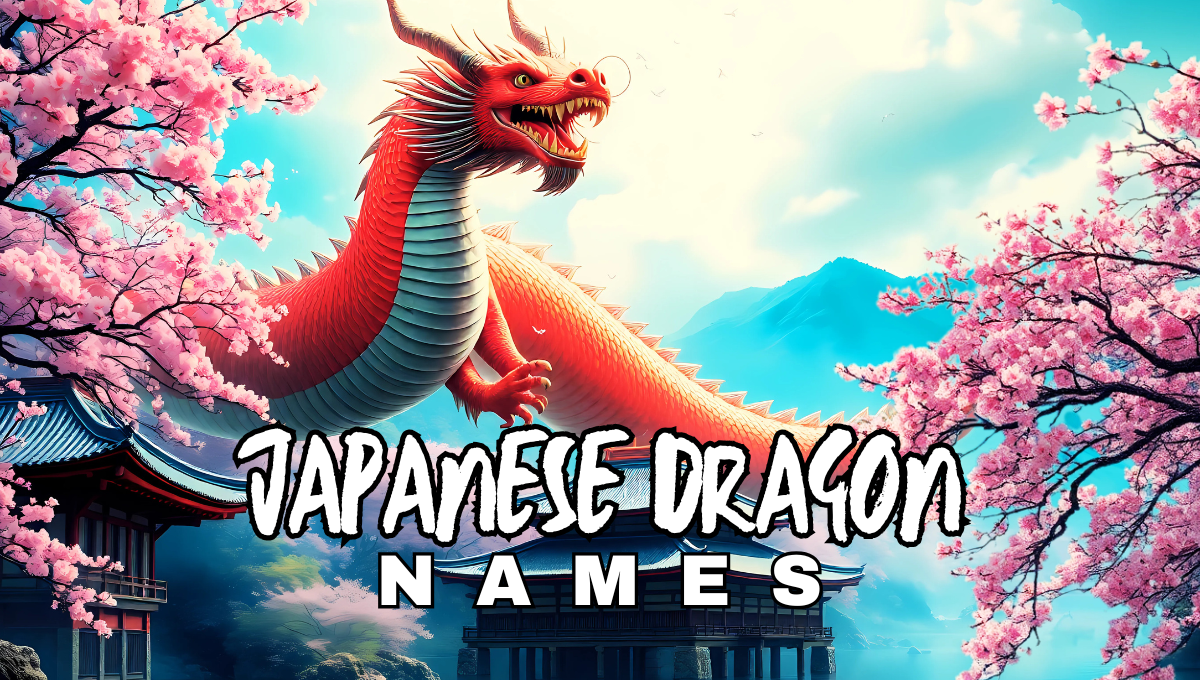Dragons symbolize transformation, representing the cycles of life, death, and rebirth. Their names often reflect this quality, conveying meanings tied to change and growth. Famous Japanese Dragon Names (With Meanings) exemplify this symbolism, capturing the essence of these mythical beings and their cultural significance.
These names offer insights into the rich tapestry of Japanese mythology and folklore. Each name tells a unique story, revealing deep meanings that have evolved over time. By exploring these origins and their cultural importance, we enhance our understanding of the traditions that have shaped Japanese society, highlighting the vital connection between mythology and cultural identity.
Cultural Names for Japanese Dragon
Names derived from Japanese culture and mythology, reflecting traditional beliefs and values.
- Kōryū – Light Dragon
- Tatsunoko – Dragon Child
- Ryūjin – Dragon God of the Sea
- Suijin-Ryū – Water God Dragon
- Amaterasu-Ryū – Sun Dragon, after the Shinto sun goddess
- Fūryū – Wind Dragon
- Raijin-Ryū – Thunder Dragon, tied to the thunder deity
- Shiro-Ryū – White Dragon, symbolizing purity
- Tsurugi-Ryū – Sword Dragon, a cultural symbol of honor
- Engetsu-Ryū – Crescent Moon Dragon
- Shiden-Ryū – Purple Lightning Dragon
- Kaze-Ryū – Wind Spirit Dragon
- Seiryū – Azure Dragon, one of the Four Guardian Beasts
- Hinote-Ryū – Flame Dragon
- Hikari-Ryū – Radiant Dragon
- Kinjirō-Ryū – Golden Path Dragon
- Tsukuyomi-Ryū – Moonlight Dragon
- Asahi-Ryū – Morning Sun Dragon
- Hoshikuzu-Ryū – Starlight Dragon
- Nami-Ryū – Wave Dragon
- Kyōka-Ryū – Resonating Flower Dragon
- Hisui-Ryū – Jade Dragon
- Tenshi-Ryū – Angelic Dragon
- Kairaku-Ryū – Joyful Dragon
- Mokusei-Ryū – Jupiter Dragon
- Kagayaki-Ryū – Shining Dragon
- Sora-Ryū – Heaven Dragon
Legendary Names for Japanese Dragon
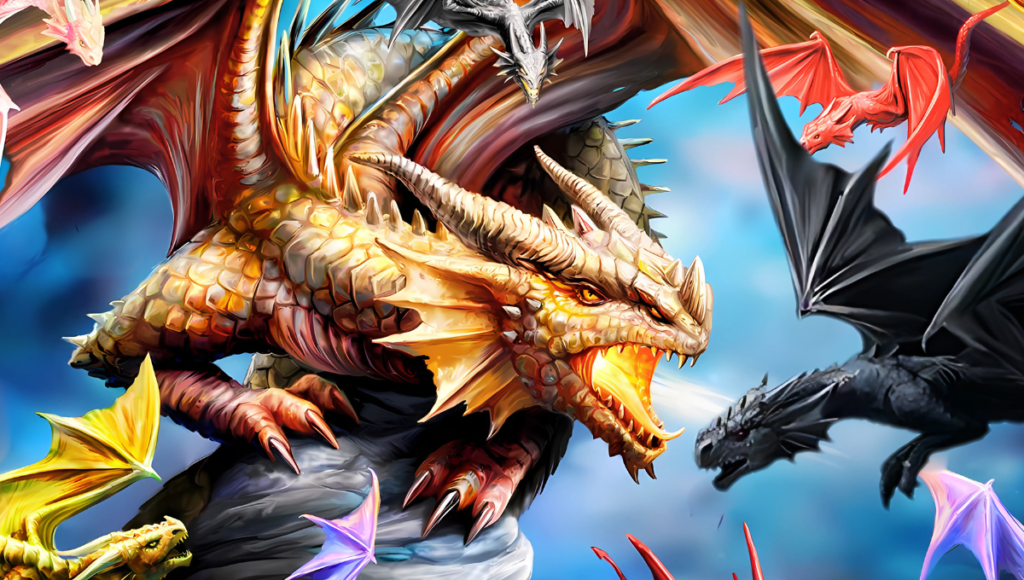
These names are inspired by legendary figures, mythical creatures, and renowned folklore, reflecting their powerful and iconic nature.
- Kushinada-Ryū – From the princess saved by Susanoo from Yamata-no-Orochi
- Suzaku-Ryū – Dragon tied to the Vermillion Bird of the South
- Genbu-Ryū – Dragon associated with the Black Tortoise of the North
- Byakko-Ryū – White Tiger-inspired Dragon of the West
- Kirin-Ryū – Named after the mythical Kirin, symbolizing prosperity
- Amemasu-Ryū – Legendary fish-dragon from Ainu folklore
- Susanoo-Ryū – Named after the storm god who defeated Yamata-no-Orochi
- Izanami-Ryū – Dragon tied to the goddess of creation and death
- Kagutsuchi-Ryū – Flame Dragon, named after the god of fire
- Watatsumi-Ryū – Sea Dragon, linked to the water deity Watatsumi
- Ōryū – Great Dragon, a title given to noble legendary dragons
- Takemikazuchi-Ryū – Named after the thunder god and martial arts deity
- Iwanaga-Ryū – Immortal Dragon, derived from Iwanaga-hime
- Sarutahiko-Ryū – Guiding Dragon, after the deity of paths and guidance
- Yatagarasu-Ryū – Dragon of the mythical three-legged crow
- Izumo-Ryū – After the sacred Izumo province, home to many myths
- Tengu-Ryū – Dragon inspired by the legendary Tengu spirits
- Honshō-Ryū – Original Victory Dragon, symbolizing triumph
- Nagi-Ryū – Calm Dragon, after the legendary Izanagi
- Raikō-Ryū – Thunder Emperor Dragon
- Tamamo-no-Mae Ryū – Inspired by the mythical nine-tailed fox
- Tsuru-Ryū – Crane Dragon, a symbol of longevity and wisdom
- Hakutaku-Ryū – Dragon inspired by the wise mythical beast
- Fujin-Ryū – Wind God Dragon
- Ibuki-Ryū – Dragon of Mt. Ibuki, a sacred mountain
- Kamuy-Ryū – Ainu dragon of the gods
- Momotaro-Ryū – Inspired by the hero of the peach-born legend
Elemental Names for Japanese Dragons
These names represent dragons associated with the natural elements, embodying their power and essence.
- Hisuiryū – Jade Dragon
- Hikariryū – Light Dragon
- Kagenoryū – Shadow Dragon
- Nōmuryū – Mist Dragon
- Taiyōryū – Sun Dragon
- Tsukiryū – Moon Dragon
- Hyōryū – Ice Dragon
- Yūryū – Rain Dragon
- Arashiryū – Storm Dragon
- Shōkiryū – Smoke Dragon
- Fukuryū – Floating Dragon
- Kōnoryū – Lava Dragon
- Sekiryū – Red Stone Dragon
- Kinryū – Golden Dragon
- Ginryū – Silver Dragon
- Soraryū – Sky Dragon
- Shimizuryū – Pure Water Dragon
- Enryū – Flame Dragon
- Denryū – Electric Dragon
- Shingetsuryū – New Moon Dragon
- Nishikiryū – Rainbow Dragon
- Kumoryū – Cloud Dragon
- Kōkiryū – Air Dragon
- Aokiryū – Blue Energy Dragon
- Yoganoryū – Magma Dragon
- Haruryū – Spring Dragon
Symbolic Names for Japanese Dragon
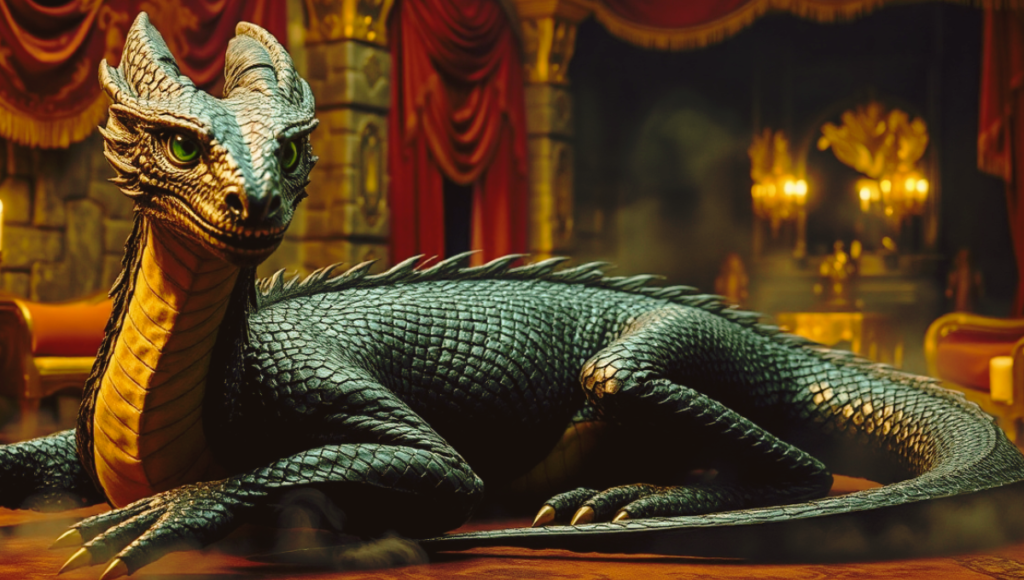
These names embody abstract concepts, virtues, and philosophies significant in Japanese culture.
- Akarui-Ryū – Brightness Dragon
- Chishiki-Ryū – Knowledge Dragon
- Eikō-Ryū – Glory Dragon
- Eryū – Gratitude Dragon
- Fūbutsu-Ryū – Elegance Dragon
- Fushigi-Ryū – Mysterious Dragon
- Gaman-Ryū – Perseverance Dragon
- Gensō-Ryū – Illusion Dragon
- Heiwa-Ryū – Peace Dragon
- Chikara-Ryū – Strength Dragon
- Kibo-Ryū – Hope Dragon
- Shinjitsu-Ryū – Truth Dragon
- Yuuki-Ryū – Bravery Dragon
- Eien-Ryū – Eternal Dragon
- Jiyū-Ryū – Freedom Dragon
- Kesshin-Ryū – Determination Dragon
- Reiki-Ryū – Spirit Dragon
- Zenryū – Meditation Dragon
- Kokororyū – Heart Dragon
- Hōryū – Treasure Dragon
- Shōfuryū – Victory Dragon
- Ryokō-Ryū – Harmony Dragon
- Hōnen-Ryū – Abundance Dragon
- Jishin-Ryū – Confidence Dragon
- Kakushin-Ryū – Innovation Dragon
- Kanzen-Ryū – Perfect Dragon
- Kizuna-Ryū – Bond Dragon
- Kōryō-Ryū – Ambition Dragon
- Seiryoku-Ryū – Energy Dragon
- Sekai-Ryū – World Dragon
- Setsunai-Ryū – Nostalgic Dragon
- Shigoto-Ryū – Dedication Dragon
- Shinnen-Ryū – Faith Dragon
- Shinpi-Ryū – Mystic Dragon
- Shinrai-Ryū – Trust Dragon
- Shōri-Ryū – Victory Dragon
- Utsukushi-Ryū – Beauty Dragon
- Yūai-Ryū – Friendship Dragon
- Yūki-Ryū – Courage Dragon
- Yume-Ryū – Dream Dragon
Fantasy Names for Japanese Dragon
These names capture the imaginative and magical essence of fantastical worlds.
- Hoshikagerū – Star Shadow Dragon
- Yūgoryū – Twilight Dragon
- Kiryūjin – Ethereal Spirit Dragon
- Kaijuryū – Monster Dragon
- Amaryū – Heaven Dragon
- Tokiryū – Time Dragon
- Yumekage-Ryū – Dream Shadow Dragon
- Tsunaryū – Tidal Dragon
- Fantajiryū – Fantasy Dragon
- Mugenryū – Infinite Dragon
- Shinryū – Divine Fantasy Dragon
- Chōryū – Super Dragon
- Kaminoryū – Heavenly King Dragon
- Hikariryū – Prism Dragon
- Kesshōryū – Crystal Dragon
- Mahōryū – Magical Dragon
- Kankairyū – Void Dragon
- Utsushiryū – Reflection Dragon
- Hoshihikiryū – Shooting Star Dragon
- Chōwakaryū – Harmony Dragon
- Soratogeryū – Sky Voyager Dragon
- Mirairyū – Future Dragon
- Ankoku-Ryū – Abyss Dragon
- Hyōryū – Frostbite Dragon
- Kōkamiryū – Radiant Flower Dragon
- Hōseiryū – Gemstone Dragon
- Densetsuryū – Legendary Dragon
- Megumiryū – Blessed Dragon
- Kōgenryū – Highland Dragon
- Gesshōryū – Lunar Shine Dragon
- Sunaikiryū – Sandstorm Dragon
- Hōryū – Treasure Dragon
- Jōganryū – Pure Eye Dragon
- Hoshimiryū – Star Lake Dragon
- Ryūzanka – Mountain Dragon
- Yōseiryū – Fairy Dragon
- Kakushiryū – Hidden Dragon
- Kōsokuryū – Light Speed Dragon
- Zetsumetsuryū – Extinct Dragon
Contemporary Names for Japanese Dragon
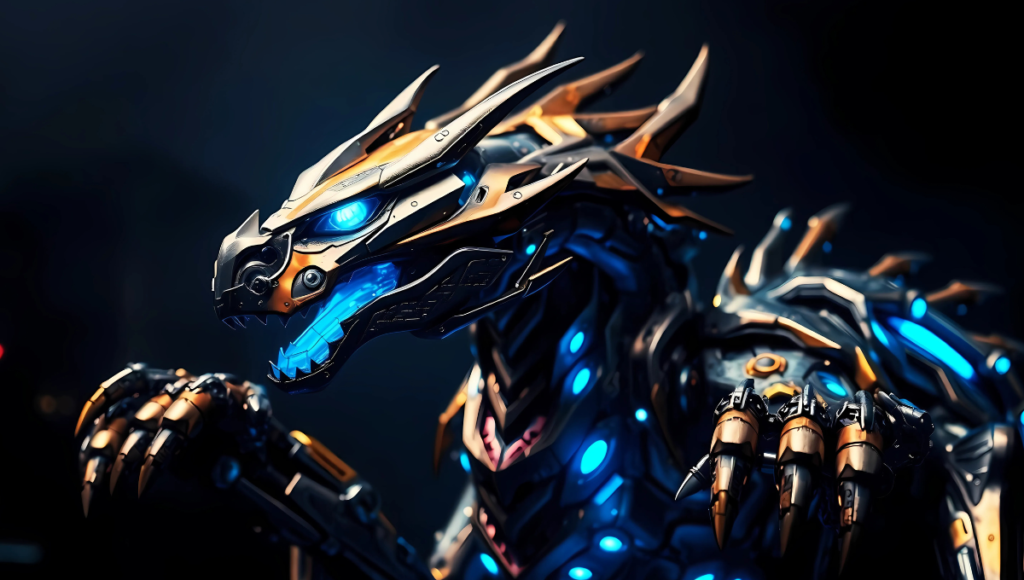
These names blend traditional dragon motifs with modern and futuristic themes, reflecting innovation and the present era.
- Tekunorojī-Ryū – Technology Dragon
- Kōdōryū – Advanced Dragon
- Hītoronoryū – Photon Dragon
- Denki-Ryū – Electric Dragon
- Roboryū – Robot Dragon
- Kaitōryū – Cyberspace Dragon
- Hoshimiryū – Galactic Dragon
- Jitenshiryū – Mechanized Dragon
- AIsenryū – Artificial Intelligence Dragon
- Kaseiryū – Satellite Dragon
- Jetoryū – Jet Dragon
- Pūrifīryū – Purifier Dragon
- Kōkūryū – Aerospace Dragon
- Yūreiryū – Hologram Dragon
- Masutāryū – Master Dragon
- Zōhōryū – Data Dragon
- Denryokuryū – Power Grid Dragon
- Intāryū – Internet Dragon
- Purotokoru-Ryū – Protocol Dragon
- Saikyōryū – Ultimate Dragon
- Tensōryū – Transmission Dragon
- Kūki-Ryū – Atmospheric Dragon
- Senkyoryū – Tactical Dragon
- Hikarikyoku-Ryū – Light Beam Dragon
- Shōgekiryū – Impact Dragon
- Raidoryū – Wireless Dragon
- Fōrumuryū – Formula Dragon
- Taimuryū – Temporal Dragon
- Raitonryū – Lightning Circuit Dragon
- Denshiryū – Quantum Dragon
- Mekaryū – Microchip Dragon
- Kūryū – Cloud Dragon
- Hanryū – Current Flow Dragon
- Shin’ōryū – Core Dragon
- Sōdoryū – Energy Flow Dragon
- Rētoryū – Retro Dragon
- Gen’ei-Ryū – Virtual Dragon
- Sōkōryū – Speed Dragon
- Zenshinryū – Progressive Dragon
- Mirai-Ryū – Future Dragon
Famous Names for Japanese Dragon
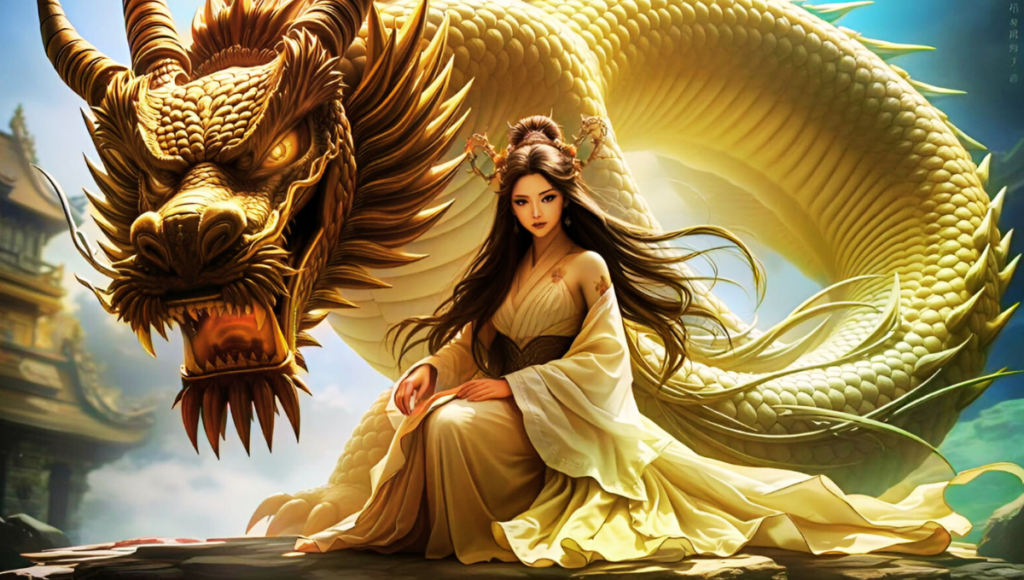
These names are inspired by iconic historical figures, warriors, and influential personas from Japanese culture.
- Jimmu-Ryū: Honoring Emperor Jimmu, representing divine ancestry.
- Izanagi-Ryū: After the creator god Izanagi, symbolizing genesis and wisdom.
- Izanami-Ryū: Inspired by the goddess Izanami, symbolizing balance of creation and destruction.
- Takeda-Ryū: After Takeda Shingen, symbolizing battle and strategy.
- Uesugi-Ryū: For Uesugi Kenshin, representing honor and discipline.
- Minamoto-Ryū: Honoring Minamoto no Yoshitsune, embodying legendary warrior spirit.
- Taira-Ryū: After Taira no Kiyomori, symbolizing power and ambition.
- Kūkai-Ryū: After Kūkai, representing spiritual enlightenment.
- Saigō-Ryū: For Saigō Takamori, symbolizing bravery and loyalty.
- Nara-Ryū: Inspired by the Nara period, representing culture and prosperity.
- Fujiwara-Ryū: After the Fujiwara clan, symbolizing noble heritage.
- Yoshida-Ryū: Honoring Yoshida Shōin, symbolizing revolutionary ideas.
- Shizuka-Ryū: After Shizuka Gozen, embodying elegance and grace.
- Hōjō-Ryū: For the Hōjō clan, symbolizing resilience and governance.
- Matsuo-Ryū: After Matsuo Bashō, representing poetic beauty.
- Rikyū-Ryū: After Sen no Rikyū, embodying tea ceremony elegance.
- Kiyomizu-Ryū: Inspired by Kiyomizu Temple, symbolizing spirituality.
- Kansai-Ryū: Representing the cultural essence of central Japan.
- Edo-Ryū: After the Edo period, symbolizing flourishing.
- Meiji-Ryū: After the Meiji Restoration, representing innovation.
- Taishō-Ryū: For the Taishō era, embodying transition and progress.
- Kamakura-Ryū: After the Kamakura Shogunate, symbolizing steadfastness.
- Hōnen-Ryū: Honoring Hōnen, representing religious harmony.
- Ikkyū-Ryū: Inspired by Ikkyū Sōjun, embodying eccentric brilliance.
- Hakuin-Ryū: After Hakuin Ekaku, symbolizing Zen wisdom.
- Sesshū-Ryū: Honoring Sesshū Tōyō, embodying artistic brilliance.
- Kanzan-Ryū: After Kanzan and Jittoku, representing reclusive wisdom.
- Akutagawa-Ryū: Inspired by Akutagawa Ryūnosuke, symbolizing literary depth.
- Tanizaki-Ryū: After Jun’ichirō Tanizaki, representing cultural reflection.
- Mishima-Ryū: Honoring Yukio Mishima, symbolizing complex legacies.
Mythological Names for Japanese Dragon
These names draw inspiration from Japanese mythology, including deities, legends, and celestial beings.
- Tachi-no-Kami-Ryū – Dragon of the Sword God
- Jizō-Ryū – Guardian of Travelers Dragon
- Kannonryū – Compassion Dragon
- Ebisu-Ryū – God of Prosperity Dragon
- Ōkuninushi-Ryū – Deity of Magic and Medicine Dragon
- Sarutahiko-Ryū – Earth Spirit Dragon
- Kome-no-Mikoto-Ryū – Dragon of the Rice Deity
- Enmusubi-Ryū – Dragon of Fate and Love
- Kojiki-Ryū – Dragon of Ancient Chronicles
- Nihonshoki-Ryū – Historical Myth Dragon
- Susa-Ryū – Dragon of Chaos and Order
- Himiko-Ryū – Priestess Dragon
- Shinto-Shrine-Ryū – Dragon of the Sacred Shrine
- Takachiho-Ryū – Dragon of the Heavenly Descent
- Kaname-Ryū – Pillar of Heaven Dragon
- Shinwa-Ryū – Mythic Saga Dragon
- Yamata-Ryū – Dragon of the Eight-Fold Path
- Shinto-Ryū – Divine Path Dragon
- Kami-Ryū – Divine Spirit Dragon
- Tenryū – Dragon of the Sky
- Chi-ryū – Dragon of the Earth
- Seiryu – Azure Dragon of the East
- Genbu-Ryū – Black Tortoise Dragon of the North
- Suzaku-Ryū – Vermilion Bird Dragon of the South
- Shinto-Shrine-Ryū – Dragon of the Sacred Shrine
- Kaze-no-Samurai-Ryū – Dragon of the Wind Samurai
- Hi-no-Kami-Ryū – Dragon of the Sun God
- Tsukuyomi-Ryū – After Tsukuyomi-no-Mikoto
- Fujin-Ryū – After Fujin, the God of Wind
- Kome-no-Mikoto-Ryū – Dragon of the Rice Deity
God Names for Japanese Dragon
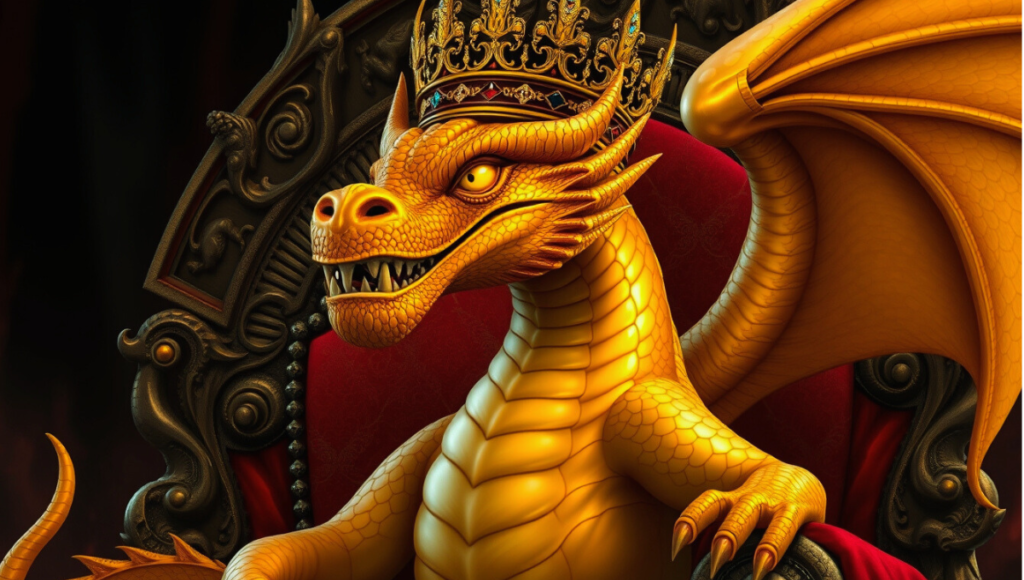
These names resonate with divine power and represent the celestial and omnipotent qualities of gods.
- Kamigami-Ryū – Dragon of the Gods
- Hikari-Ryū – Dragon of Radiance
- Reigami-Ryū – Spirit God Dragon
- Arahitogami-Ryū – Living God Dragon
- Shingami-Ryū – Divine Soul Dragon
- Daigongen-Ryū – Great Incarnation Dragon
- Chikara-Ryū – Power of the Divine Dragon
- Tenshin-Ryū – Heavenly Truth Dragon
- Sōtenshin-Ryū – Dragon of Celestial Harmony
- Shinrai-Ryū – Divine Thunder Dragon
- Shinsei-Ryū – Holy Dragon
- Daidairyu – Grand God Dragon
- Shūsai-Ryū – Divine Grace Dragon
- Reiō-Ryū – Spirit King Dragon
- Denshin-Ryū – Dragon of Heavenly Communication
- Ryōkai-Ryū – Dragon of Divine Realms
- Kagayaki-Ryū – Glorious Radiance Dragon
- Shinri-Ryū – Dragon of Truth and Faith
- Seitō-Ryū – Dragon of the Holy Path
- Gōdoryū – Majestic God Dragon
- Kamisama-Ryū – Dragon of the Divine Being
- Seishin-Ryū – Holy Spirit Dragon
- Tenshō-Ryū – Dragon of Heavenly Ascension
- Hoshikami-Ryū – Star God Dragon
- Tamashī-Ryū – Dragon of Eternal Soul
Devil Names for Japanese Dragon
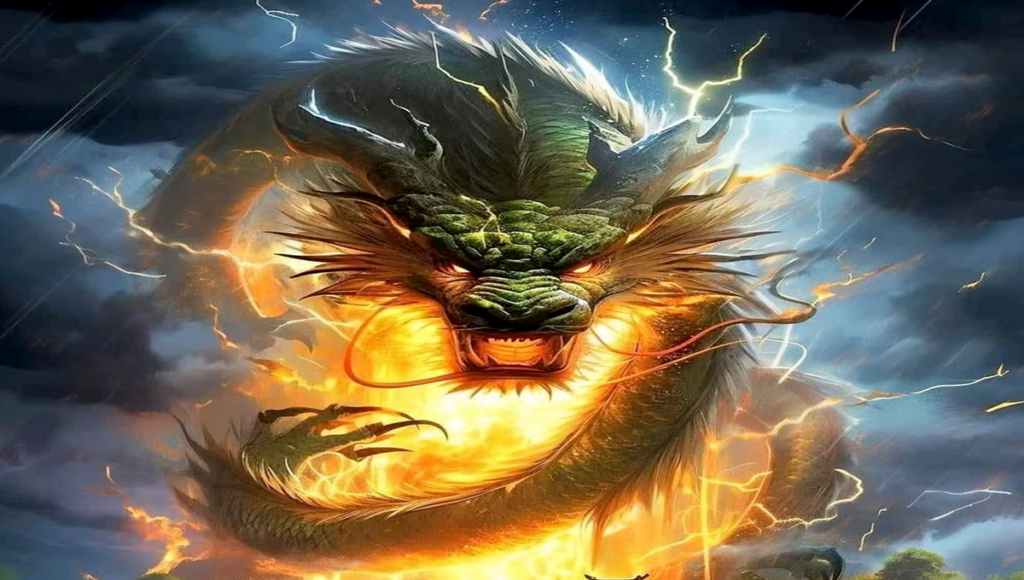
These names evoke fearsome, dark, and malevolent qualities, representing the underworld and chaos.
- Akuma-Ryū – Demon Dragon
- Yami-Ryū – Dragon of Darkness
- Kurayami-Ryū – Dragon of Eternal Shadow
- Jigoku-Ryū – Hellfire Dragon
- Maō-Ryū – Demon King Dragon
- Kage-Ryū – Shadow Dragon
- Meifū-Ryū – Dragon of the Netherworld
- Ankoku-Ryū – Dragon of Gloom
- Shikyō-Ryū – Death Dragon
- Enma-Ryū – Dragon of the Judge of Hell
- Oni-Ryū – Ogre Dragon
- Doku-Ryū – Poison Dragon
- Mugen-Ryū – Nightmare Dragon
- Gekido-Ryū – Wrath Dragon
- Noroi-Ryū – Dragon of Curses
- Sōhō-Ryū – Calamity Dragon
- Chimamire-Ryū – Bloodstained Dragon
- Honō-Ryū – Dragon of Hellfire Flames
- Bōkoku-Ryū – Dragon of Destruction
- Gūzen-Ryū – Dragon of Malevolence
- Kyōhaku-Ryū – Dragon of Terror
- Satsujin-Ryū – Murder Dragon
- Tamashī-Koware – Broken Soul Dragon
- Shūen-Ryū – Dragon of Doom
- Mokushiroku-Ryū – Apocalypse Dragon
Best Names for Japanese Dragon
These names are considered the epitome of power, grace, and significance, representing the best attributes a dragon can embody.
- Saikō-Ryū: Supreme Dragon – the epitome of power and wisdom, representing the pinnacle of existence.
- Chōryū: Exceptional Dragon – a symbol of unparalleled strength and grace, revered for its extraordinary presence.
- Kensei-Ryū: Dragon of Mastery – embodying ultimate skill and expertise, honored as the mentor of ancient knowledge.
- Shūryū: Exquisite Dragon – a manifestation of beauty and elegance, captivating all with its stunning allure.
- Reiryū: Spirit Dragon – a mystical being connecting the physical and spiritual realms, guiding souls with its wisdom.
- Kōsei-Ryū: Dragon of Radiant Excellence – shining brightly with brilliance and virtue, inspiring all who seek greatness.
- Meiryū: Dragon of Brightness – a beacon of light and hope, illuminating the path for those in darkness.
- Hakuryū: White Dragon – symbolizing purity and enlightenment, a guardian of truth and wisdom.
- Kinryū: Golden Dragon – representing prosperity and abundance, a harbinger of good fortune and success.
- Gōryū: Majestic Dragon – exuding an aura of regality and power, commanding respect from all who behold it.
- Shōryū: Rising Dragon – embodying the spirit of ascension, inspiring growth and progress.
- Senryū: Thousand-Year Dragon – a timeless entity, embodying the accumulated wisdom of countless generations.
- Genryū: Mysterious Dragon – shrouded in enigma, representing the unknown and the secrets of the universe.
- Seitō-Ryū: Dragon of Justice – a fierce protector of righteousness, embodying fairness and integrity.
- Ryūsei: Meteor Dragon – a force of nature, blazing through the skies with unmatched speed and power.
- Sōzō-Ryū: Creator Dragon – the architect of worlds, embodying creativity and the essence of life.
- Shinkō-Ryū: Dragon of Faith – a symbol of hope and belief, guiding followers through trials and tribulations.
- Keiryū: Sacred Dragon – revered as a divine protector, embodying holiness and spiritual purity.
- Hiryū: Flying Dragon – soaring through the heavens, representing freedom and the limitless possibilities of the sky.
- Shōgō-Ryū: Dragon of Victory – a champion of triumph, inspiring courage and determination in the face of adversity.
- Chiryū: Dragon of Wisdom – the guardian of knowledge, guiding seekers on their quest for truth and understanding.
- Hōryū: Treasure Dragon – a keeper of riches and wisdom, celebrated for its bounty and generosity.
- Shinryū: Divine Dragon – a celestial being embodying divine qualities, revered as a symbol of ultimate power.
- Tairyū: Great Dragon – a magnificent entity, embodying strength, majesty, and the spirit of greatness.
Female Names for Japanese Dragon
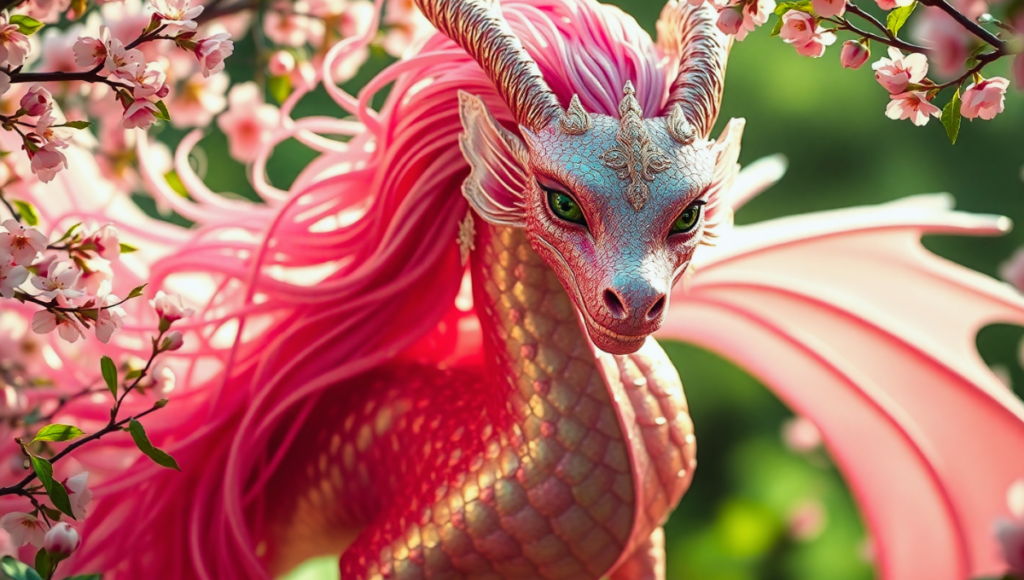
These names reflect grace, beauty, and feminine qualities while retaining the strength of a dragon.
- Sakura-Ryū – Cherry Blossom Dragon
- Yukina-Ryū – Snow Flower Dragon
- Haruna-Ryū – Spring Blossom Dragon
- Akarui-Ryū – Bright Dragon
- Mizuki-Ryū – Moon Dragon
- Kasumi-Ryū – Mist Dragon
- Hotaru-Ryū – Firefly Dragon
- Akemi-Ryū – Beautiful Dawn Dragon
- Kohana-Ryū – Little Flower Dragon
- Ayaka-Ryū – Colorful Flower Dragon
- Chisato-Ryū – Thousand Wisdom Dragon
- Reina-Ryū – Queen Dragon
- Kiyomi-Ryū – Pure Beauty Dragon
- Emi-Ryū – Blessed Dragon
- Megumi-Ryū – Dragon of Blessings
- Sumire-Ryū – Violet Flower Dragon
- Harumi-Ryū – Springtime Beauty Dragon
- Yuzuki-Ryū – Gentle Moon Dragon
- Sayuri-Ryū – Small Lily Dragon
- Ayumi-Ryū – Progress Dragon
- Nadeshiko-Ryū – Perfect Blossom Dragon
- Kanna-Ryū – God’s Flower Dragon
- Rika-Ryū – Dragon of True Fragrance
- Akiko-Ryū – Dragon of Autumn Light
- Chiyoko-Ryū – Dragon of Eternal Bliss
- Satomi-Ryū – Wise Beauty Dragon
- Yume-Ryū – Dream Dragon
- Asuka-Ryū – Tomorrow’s Fragrance Dragon
- Yuri-Ryū – Lily Flower Dragon
- Kaede-Ryū – Maple Leaf Dragon
Male Names for Japanese Dragon
These names represent strength, leadership, and masculine attributes of dragons.
- Ryūnosuke – Noble Dragon
- Tatsuya – Dragon Hero
- Kenzō-Ryū – Strong Dragon
- Haruto-Ryū – Sunlight Dragon
- Riku-Ryū – Land Dragon
- Masaru-Ryū – Victory Dragon
- Akihiko-Ryū – Bright Prince Dragon
- Takeo-Ryū – Warrior Dragon
- Hiroshi-Ryū – Generous Dragon
- Kazuki-Ryū – Harmonious Dragon
- Daiki-Ryū – Great Glory Dragon
- Sōta-Ryū – Swift Dragon
- Yūma-Ryū – Calm Hero Dragon
- Ichirō-Ryū – First Son Dragon
- Hideki-Ryū – Excellent Tree Dragon
- Kaito-Ryū – Ocean Dragon
- Akira-Ryū – Clear Sky Dragon
- Subaru-Ryū – Constellation Dragon
- Hayato-Ryū – Falcon Dragon
- Genji-Ryū – Legendary Warrior Dragon
- Kiyoshi-Ryū – Pure Dragon
- Toshiro-Ryū – Talented Dragon
- Noboru-Ryū – Ascending Dragon
- Isamu-Ryū – Courageous Dragon
- Jōtarō-Ryū – Steadfast Dragon
- Kōta-Ryū – Peaceful Dragon
- Makoto-Ryū – Sincere Dragon
- Hiroyuki-Ryū – Abundant Dragon
- Toshio-Ryū – Dragon of Wisdom
- Yūji-Ryū – Brave Second Son Dragon
Historical Names for Japanese Dragon
These names are inspired by historical events, eras, or figures, giving them a timeless essence.
- Amakusa-Ryū – Dragon of Rebellion
- Shinsengumi-Ryū – Dragon of the Samurai Police
- Bakumatsu-Ryū – End of Shogunate Dragon
- Himeji-Ryū – Castle Dragon
- Ryukyu-Ryū – Okinawan Dragon
- Satsuma-Ryū – Samurai Dragon
- Chōshū-Ryū – Revolutionary Dragon
- Kusunoki-Ryū – Loyal Retainer Dragon
- Gekokujō-Ryū – Overthrow Dragon
- Kyushu-Ryū – Southern Region Dragon
- Kanagawa-Ryū – Coastal Dragon
- Heian-Ryū – Peaceful Era Dragon
- Sengoku-Ryū – Warring States Dragon
- Meiji-Ryū – Enlightened Dragon
- Edo-Ryū – Dragon of the Edo Period
- Kamakura-Ryū – Dragon of the Shogunate
- Nara-Ryū – Ancient Capital Dragon
- Tokugawa-Ryū – Shogun’s Dragon
- Kyoto-Ryū – Imperial Dragon
- Hōjō-Ryū – Samurai Clan Dragon
- Asuka-Ryū – Dragon of the Asuka Period
- Taishō-Ryū – Dragon of Great Righteousness
- Shōwa-Ryū – Dragon of Harmony
- Yamato-Ryū – Ancient Japan Dragon
- Genpei-Ryū – Dragon of the Genpei War
- Minamoto-Ryū – Dragon of the Minamoto Clan
- Taira-Ryū – Dragon of the Taira Clan
- Ieyasu-Ryū – Tokugawa Legacy Dragon
- Taika-Ryū – Great Reform Dragon
- Hideyoshi-Ryū – Unifier Dragon
FAQs : : Famous Japanese Dragon Names (With Meanings)
What is the meaning of “Kaminari-sama”?
Kaminari-sama (雷神) translates to “Thunder God” and is often depicted with dragon-like attributes, representing thunder and lightning in Japanese mythology.
Who is the dragon associated with the harvest?
Kuraokami (倉神) is the dragon god of snow and agriculture, believed to oversee the harvest and ensure a bountiful yield.
What does “Ryūjin” symbolize in Japanese culture?
Ryūjin (龍神) is the dragon god of the sea who controls tides, rain, and weather, symbolizing the immense power and mystery of water.
What is the significance of “Ryūgū-jō”?
Ryūgū-jō (竜宮城), or “Dragon Palace,” is a mythical underwater palace ruled by Ryūjin, symbolizing abundance and the mysteries of the ocean.
What does “Orochi” signify in mythology?
Orochi (大蛇), also known as Yamata no Orochi, is the “Great Serpent” with eight heads and tails, symbolizing chaos and the triumph of good over evil.
What is the role of “Seiryū” in Japanese mythology?
Seiryū (青龍) is the Azure Dragon, one of the four sacred beasts in East Asian mythology, representing the east, spring, and protection.
What does “Hakuryū” mean in Japanese culture?
Hakuryū (白竜), or the White Dragon, represents purity, peace, and spiritual enlightenment in various tales and legends.
What is the connection between “Tatsu no Otoshigo” and dragons?
Tatsu no Otoshigo (辰の落とし子) translates to “Dragon’s Offspring,” referring to individuals believed to inherit dragon-like qualities such as strength and wisdom.
What is “Kōryū” known for in folklore?
Kōryū (光龍), meaning “Light Dragon,” is associated with illumination, wisdom, and benevolence, often guiding or protecting people in legends.
What is “Mizuchi” in Japanese folklore?
Mizuchi (蛟) is a water spirit or dragon that inhabits rivers and lakes, symbolizing the mysterious and life-giving force of water.
CONCLUSION
Famous Japanese Dragon Names (With Meanings) carry deep cultural significance, reflecting the essence of power, wisdom, and protection in Japanese folklore. These legendary creatures have shaped myths for centuries, captivating imaginations with their awe-inspiring tales. Whether in ancient stories or modern media, these names offer a unique window into the vibrant history and mythology of Japan’s captivating culture.
Discover unique and meaningful names for every occasion at Names Geeko, your ultimate guide to the perfect name!


